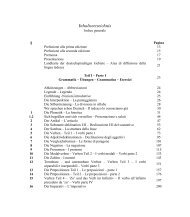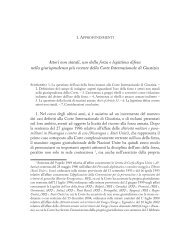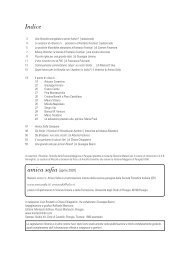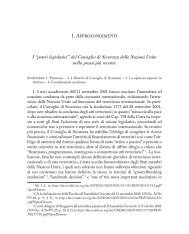Objective Territorial Principle or Effects Doctrine? Jurisdiction and ...
Objective Territorial Principle or Effects Doctrine? Jurisdiction and ...
Objective Territorial Principle or Effects Doctrine? Jurisdiction and ...
Create successful ePaper yourself
Turn your PDF publications into a flip-book with our unique Google optimized e-Paper software.
In.Law | 6 (2006) | 297<br />
ing an apology f<strong>or</strong> Nazism <strong>or</strong> a contesting of Nazi crimes.” 61 Faced with this <strong>or</strong>der,<br />
Yahoo! Inc. argued that filtering of users located abroad in <strong>or</strong>der to comply with<br />
the <strong>or</strong>der was technically difficult, if not impossible. The panel of experts that<br />
conducted a feasibility study concluded, however, that such filtering was technically<br />
possible: it was possible to block 70% of the access from France to the sites<br />
in question. 62 The panel of experts further believed that the blocking rate would<br />
be as high as 90% if the website required the internet users to declare their location.<br />
Given this assessment, the Tribunal de Gr<strong>and</strong>e Instance reaffirmed its earlier<br />
<strong>or</strong>der. 63 The court <strong>or</strong>ders that assume the use of this filtering technique constitute<br />
neither the acceptance of the absence of territ<strong>or</strong>ies in cyberspace n<strong>or</strong> the interference<br />
into w<strong>or</strong>ld-wide activities of Yahoo! Inc. 64 On the contrary, they reflect<br />
a sense of territ<strong>or</strong>y in cyberspace, a simulation of the traditional environment in<br />
which the established principles of jurisdiction could function. The sense of territ<strong>or</strong>y<br />
of the Tribunal de Gr<strong>and</strong>e Instance is also clear in the expressions it uses:<br />
Yahoo! Inc. is <strong>or</strong>dered “to prevent surfers calling from France from viewing these<br />
[anti-Semitic] services on their computer screen”; “to identify the geographical<br />
<strong>or</strong>igin of a visiting site from the caller’s IP address, which should enable it to<br />
prevent surfers calling from France . . . from accessing services <strong>and</strong> sites which[,]<br />
when displayed on a screen installed in France[,] . . . is liable to be deemed an offence<br />
in France <strong>and</strong>/<strong>or</strong> to constitute a manifestly unlawful trouble [under French<br />
law]”; <strong>and</strong> “to take all measures to dissuade <strong>and</strong> make impossible any access by a<br />
surfer calling from France to disputed sites <strong>and</strong> services of which the title <strong>and</strong>/<strong>or</strong><br />
content constitutes a threat to internal public <strong>or</strong>der.” 65 This eff<strong>or</strong>t of restraining<br />
the scope of the <strong>or</strong>ders is indeed very consistent in French jurisprudence. Since<br />
the Yahoo! Auction case (1a), the <strong>or</strong>ders issued vis-à-vis internet companies abroad<br />
61 Yahoo! Auction case (1a), supra note 35. The translation of the <strong>or</strong>der is taken from the Yahoo!<br />
v. LICRA case (2006), supra note 32.<br />
62 Yahoo! Auction case (1b), supra note 37. Details of this expert opinion are presented in Mur-<br />
phy, supra note 60, pp. 418-20.<br />
63 Yahoo! Auction case (1b), supra note 37.<br />
64 F<strong>or</strong> the expression of such a concern, see H<strong>or</strong>atia Muir Watt, Yahoo! Cyber-Collision of Cultures:<br />
Who Regulates?, 24 Mich. J. Int’l L. (2003), p. 692; Mark S. Kende, Yahoo!: National B<strong>or</strong>ders<br />
in Cyberspace <strong>and</strong> Their Impact on International Lawyers, 32 N.M. L. Rev. (2002), p. 8; Andreas<br />
Manolopoulos, Raising “Cyber-B<strong>or</strong>ders”: The Interaction Between Law <strong>and</strong> Technology, 11 Int’l J.L. &<br />
Info. Tech. (2003), pp. 43-44.<br />
65 The translation with these emphases is taken from the Yahoo! v. LICRA case (2006), supra<br />
note 32.

















